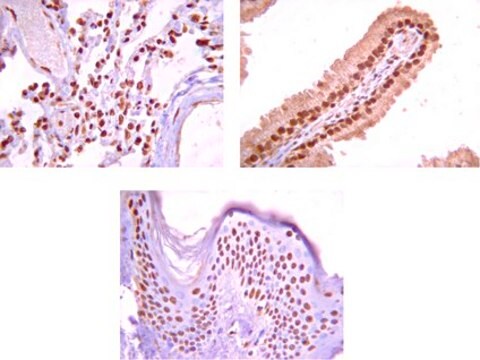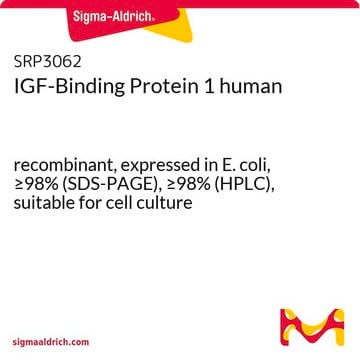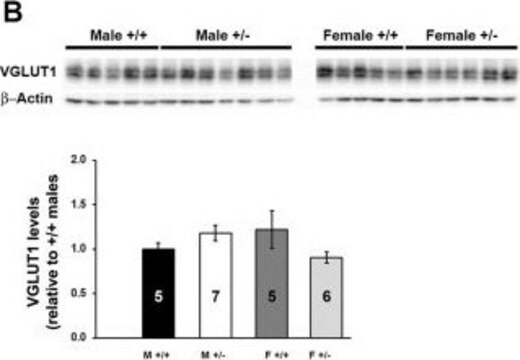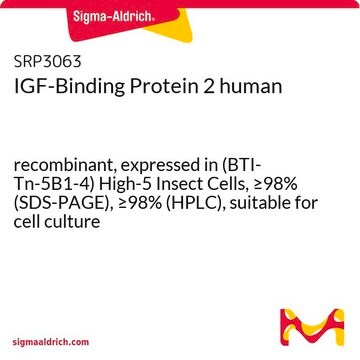OP01A
Anti-v-H-Ras (Ab-1) Rat mAb (Y13-259) Agarose Conjugate
suspension (Liquid), clone Y13-259, Calbiochem®
Sign Into View Organizational & Contract Pricing
All Photos(1)
About This Item
UNSPSC Code:
12352203
NACRES:
NA.43
Recommended Products
biological source
rat
Quality Level
antibody product type
primary antibodies
clone
Y13-259, monoclonal
form
suspension (Liquid)
contains
≤0.1% sodium azide as preservative
species reactivity
rat, mouse, human
manufacturer/tradename
Calbiochem®
storage condition
do not freeze
isotype
IgG1
shipped in
wet ice
storage temp.
2-8°C
target post-translational modification
unmodified
General description
Rat monoclonal antibody generated by immunizing Sprague Dawlay rats with the specified immunogen and fusing splenocytes with Y3Ag1.2.3 rat myeloma cells. Conjugated to agarose. Recognizes the ~21 kDa ras protein (see comments).
Recognizes the ~21 kDa ras protein in SW480 and Y1 cells and normal skin tissue. For neutralization studies, Cat. No. OP01L is recommended. For immunoprecipitation, Cat. No. OP01A is recommended.
This Anti-v-H-Ras (Ab-1) Rat mAb (Y13-259) Agarose Conjugate is validated for use in Immunoprecipitation, Other Applications for the detection of v-H-Ras (Ab-1).
Immunogen
recombinant p21 Ras
Application
Immunoprecipitation (15 µl beads or 1 µg antibody per sample, see comments)
Other Applications (see comments)
Other Applications (see comments)
Packaging
Please refer to vial label for lot-specific concentration.
Warning
Toxicity: Standard Handling (A)
Physical form
In PBS.
Analysis Note
Positive Control
SW 480 or Y1 cells or normal skin tissue
SW 480 or Y1 cells or normal skin tissue
Other Notes
Agarose conjugated recommended for immunoprecipitation. For frozen sections, paraffin sections, immunoblotting, neutralization, and immunofluoresence use Cat. No. OP01 or OP01L. Broadly reactive by immunoprecipitation with both phosphorylated and non-phosphorylated forms of v-H-ras and v-K-ras (see application references) and reacts with the p21 translational products of the H-, K-, and N-ras human genes (see application references). This antibody does not cross-react with rap. Neutralizes the biological and biochemical activities of H-, K-, and N-ras p21 of vertebrates by binding to residues Glu-63, Ser-65, Ala-66, Met-67, Gln-70, and Arg-73 (see application references). 15 µl agarose conjugate is recommended to be used as an immunoconcentrator prior to western blot analysis of p21ras with another antibody. To immunoprecipitate with the unconjugated antibody, use Protein A with a rabbit anti-rat IgG or Protein G PLUS with a goat anti-rat IgG. Protein A alone will not immunoprecipitate rat IgG. A doublet may be detected corresponding to ras protein with and without farnesyl group. Antibody should be titrated for optimal results in individual systems.
Shimizu, K., et al. 1983. Proc. Natl. Acad. Sci. USA80, 2112.
Taparowsky, E., et al. 1983. Cell34, 581.
Ellis, R.W., et al. 1981. Nature292, 506.
Shih, T.Y., et al. 1980. Nature287, 686.
Taparowsky, E., et al. 1983. Cell34, 581.
Ellis, R.W., et al. 1981. Nature292, 506.
Shih, T.Y., et al. 1980. Nature287, 686.
Legal Information
CALBIOCHEM is a registered trademark of Merck KGaA, Darmstadt, Germany
Not finding the right product?
Try our Product Selector Tool.
Storage Class Code
11 - Combustible Solids
WGK
WGK 1
Flash Point(F)
Not applicable
Flash Point(C)
Not applicable
Certificates of Analysis (COA)
Search for Certificates of Analysis (COA) by entering the products Lot/Batch Number. Lot and Batch Numbers can be found on a product’s label following the words ‘Lot’ or ‘Batch’.
Already Own This Product?
Find documentation for the products that you have recently purchased in the Document Library.
Lauren M Adams et al.
The Journal of biological chemistry, 299(1), 102768-102768 (2022-12-06)
The KRAS gene is one of the most frequently mutated oncogenes in human cancer and gives rise to two isoforms, KRAS4A and KRAS4B. KRAS post-translational modifications (PTMs) have the potential to influence downstream signaling. However, the relationship between KRAS PTMs
K Fukuda et al.
Hepatology (Baltimore, Md.), 28(3), 796-804 (1998-09-10)
Transforming growth factor betas (TGF-betas) are the potent growth inhibitors for various cell types. Certain transformed cells, however, show poor response to TGF-beta-induced growth inhibition, which contributes to their uncontrolled proliferation. Recently, we have reported that TGF-beta1 induces degradation of
Hui Jing et al.
eLife, 6 (2017-12-15)
Ras proteins play vital roles in numerous biological processes and Ras mutations are found in many human tumors. Understanding how Ras proteins are regulated is important for elucidating cell signaling pathways and identifying new targets for treating human diseases. Here
S Zheng et al.
Oncogene, 26(48), 6896-6904 (2007-05-09)
Lung cancer is a devastating disease with poor prognosis. The design of better therapies for lung cancer patients would be greatly aided by good mouse models that closely resemble the human disease. Unfortunately, current models for lung adenocarcinoma are inadequate
Behzad Shariati et al.
Molecular and cellular neurosciences, 70, 54-67 (2015-11-26)
Guanine nucleotide exchange factors directly activated by cAMP (Epacs) have emerged as important signaling molecules mediating persistent hypersensitivity in animal models of inflammation, by augmenting the excitability of sensory neurons. Although Epacs activate numerous downstream signaling cascades, the intracellular signaling
Our team of scientists has experience in all areas of research including Life Science, Material Science, Chemical Synthesis, Chromatography, Analytical and many others.
Contact Technical Service







